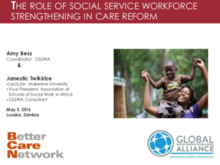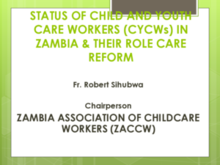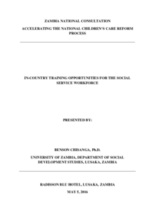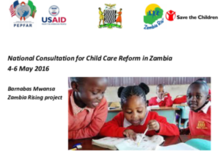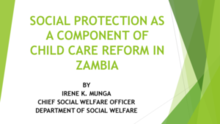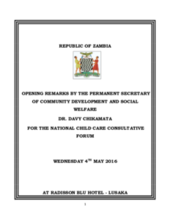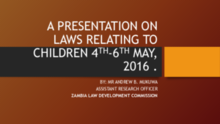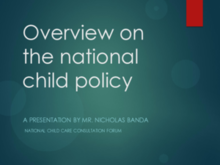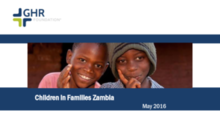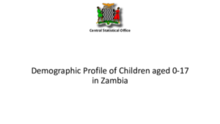Displaying 1001 - 1010 of 1617
This presentation by Amy Bess & Janestic Twikirize of the Global Social Service Workforce Alliance (GSSWA), given at the Zambia National Consultation to Accelerate Care Reform, presents a working paper by GSSWA and BCN on the role that building the capacity of social service workers has in reforming child care systems.
This presentation from Fr. Robert Sihubwa, Chairperson of the Zambia Association of Child Care Workers, given at the Zambia National Consultation to Accelerate Care Reform, provides an overview of the status of child care workers in Zambia and their role in, and contributions to, care reform.
This presentation from Benson Chisanga, of the University of Zambia’s Department of Social Development Studies, given at the Zambia National Consultation to Accelerate Care Reform, provides basic information on opportunities for the training of the social service workforce in Zambia, focusing on levels of training, challenges, and future prospects.
This presentation from the Zambia Rising project, given at the Zambia National Consultation to Accelerate Care Reform, highlights the two key challenges facing Zambia’s social work workforce that Zambian delegates have identified and outlines strategies for social workforce strengthening based on an HR assessment and gap analysis.
This presentation from the Department of Social Welfare, given at the Zambia National Consultation to Accelerate Care Reform, describes the Zambia Law Development Commission and its work, discusses the need to integrate social protection with child protection to meet the needs of vulnerable children and families in Zambia.
This document includes the opening remarks given on the first day of the National Consultation to Accelerate Care Reform in Zambia by Dr. Davy Chikamata, the Permanent Secretary of Community Development and Social Welfare, to the participants of the consultation.
This presentation from the Zambia Law Development Commission, given at the Zambia National Consultation to Accelerate Care Reform, describes the Zambia Law Development Commission and its work, provides an overview of the legal framework supporting child care in Zambia, and highlights potential or pending legislation related to children’s care.
This presentation from Nicholas Banda, given at the Zambia National Consultation to Accelerate Care Reform, outlines Zambia’s vision for child policy, covering child survival rights, child development rights, child protection rights, monitoring and evaluation, and institutional framework and implementation.
This presentation from GHR Foundation, given at the Zambia National Consultation to Accelerate Care Reform, presents GHR’s approach to reforming child care systems, the multiple aspects of the care system engaged, and its underlying theory of collective impact.
This presentation from Zambia's Central Statistical Office, given at the Zambia National Consultation to Accelerate Care Reform, provides data on children in Zambia, including the legal definition of a child, how many are living in Zambia, where they live, and their living arrangements.

